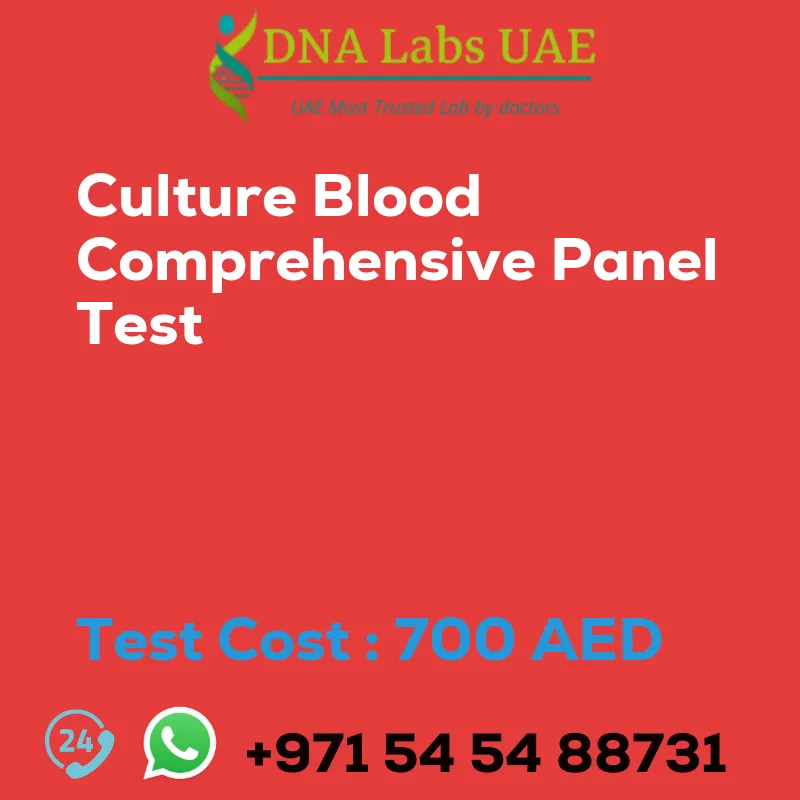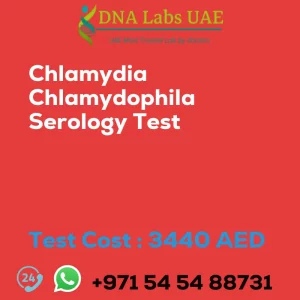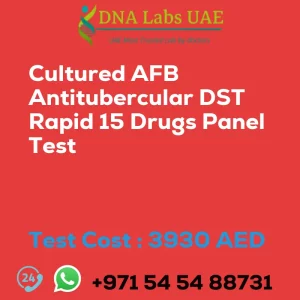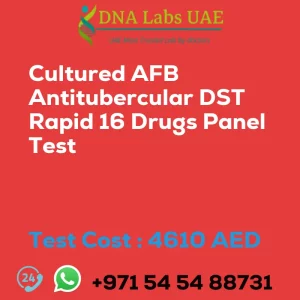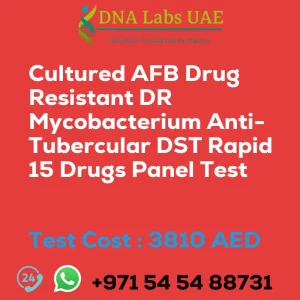CULTURE BLOOD COMPREHENSIVE PANEL Test
Overview
The Culture Blood Comprehensive Panel is a medical test offered by DNA Labs UAE that examines various components of the blood to assess a person’s overall health and detect any abnormalities or infections. It is a comprehensive panel that includes multiple tests to evaluate different aspects of the blood.
Test Components
- Culture Aerobic Blood, Rapid
- Culture Anaerobic Blood, Rapid
- Culture Fungus Blood / Body Fluids Rapid
Test Details
The Culture Blood Comprehensive Panel includes the following tests:
- Complete Blood Count (CBC): Measures the levels of red blood cells, white blood cells, and platelets in the blood. Helps diagnose conditions such as anemia, infection, or blood disorders.
- Blood Chemistry Panel: Assesses the levels of various chemicals and substances in the blood, such as electrolytes, glucose, cholesterol, liver enzymes, and kidney function markers. Helps evaluate organ function and detect conditions such as diabetes, liver or kidney disease, or imbalances in electrolytes.
- Blood Culture: Involves collecting a sample of blood and incubating it to check for the presence of bacteria, fungi, or other microorganisms that may cause infections in the bloodstream. Typically used to diagnose conditions like sepsis or bacteremia.
- Coagulation Profile: Evaluates the blood’s ability to clot properly. Measures factors involved in the coagulation process and helps diagnose bleeding disorders or assess the risk of excessive bleeding or clotting.
- Blood Typing: Determines a person’s blood type, which is important for blood transfusions or organ transplants.
- Erythrocyte Sedimentation Rate (ESR): Measures the rate at which red blood cells settle at the bottom of a test tube over a specified period. Helps detect inflammation or infection in the body.
Sample Condition
To perform the Culture Blood Comprehensive Panel, it is required to collect 8-10 mL blood aseptically in a special Plus Aerobic bottle, 8-10 mL blood aseptically in a special Plus Anaerobic bottle, and 8-10 mL whole blood/body fluids aseptically in a Myco/F-Lytic bottle available from LPL. Mix the samples by gentle swirling and ship them at room temperature. For children less than 12 years, collect 2 mL blood in a Special Paeds Plus bottle.
Report Delivery
Sample is collected daily by 3.30 pm and the report is delivered within 5-15 days.
Method
The Culture Blood Comprehensive Panel utilizes conventional culture, automated identification & sensitivity, conventional anaerobic culture, and rapid automated fungus culture methods.
Test Type
The Culture Blood Comprehensive Panel is primarily used for diagnosing infections.
Physician
The test can be ordered by a physician.
Pre Test Information
No special preparation is required for this test.
Price
The cost of the Culture Blood Comprehensive Panel test is AED 700.0.
Conclusion
The Culture Blood Comprehensive Panel is a comprehensive medical test offered by DNA Labs UAE. It examines various components of the blood to assess a person’s overall health, detect abnormalities or infections, and diagnose specific conditions. It is commonly ordered by healthcare providers to evaluate a patient’s health, monitor treatments, and provide valuable insights into their medical condition.
| Test Name | CULTURE BLOOD COMPREHENSIVE PANEL Test |
|---|---|
| Components | *CultureAerobicBlood, Rapid*Culture Anaerobic BloodRapid*Culture Fungus Blood / Body Fluids Rapid |
| Price | 700.0 AED |
| Sample Condition | Collect 8-10 mL blood aseptically in special Plus Aerobic bottle AND 8-10 mL blood aseptically in special Plus Anerobic bottle AND8-10 mL whole blood \/ body fluids aseptically in a Myco \/ F-Lytic bottle available from LPL. Mix by gentle swirling. Ship at room temperature. For children less than 12 yrs collect 2 mL blood in Special Paeds Plus bottle. |
| Report Delivery | Sample Daily by 3.30 pm; Report 5-15 days |
| Method | Conventional culture, Automated identification & sensitivity, Conventional anaerobic culture & Automated identification, Rapid automated fungus culture |
| Test type | Infections |
| Doctor | Physician |
| Test Department: | |
| Pre Test Information | No special preparation required |
| Test Details |
The Culture Blood Comprehensive Panel is a medical test that examines various components of the blood to assess a person’s overall health and detect any abnormalities or infections. It is a comprehensive panel that includes multiple tests to evaluate different aspects of the blood. Some of the tests included in the Culture Blood Comprehensive Panel may include: 1. Complete Blood Count (CBC): This test measures the levels of red blood cells, white blood cells, and platelets in the blood. It can help diagnose conditions such as anemia, infection, or blood disorders. 2. Blood Chemistry Panel: This panel includes tests that assess the levels of various chemicals and substances in the blood, such as electrolytes, glucose, cholesterol, liver enzymes, and kidney function markers. It can help evaluate organ function and detect conditions such as diabetes, liver or kidney disease, or imbalances in electrolytes. 3. Blood Culture: This test involves collecting a sample of blood and incubating it to check for the presence of bacteria, fungi, or other microorganisms that may cause infections in the bloodstream. It is typically used to diagnose conditions like sepsis or bacteremia. 4. Coagulation Profile: This test evaluates the blood’s ability to clot properly. It measures factors that are involved in the coagulation process and can help diagnose bleeding disorders or assess the risk of excessive bleeding or clotting. 5. Blood Typing: This test determines a person’s blood type, which is important for blood transfusions or organ transplants. 6. Erythrocyte Sedimentation Rate (ESR): This test measures the rate at which red blood cells settle at the bottom of a test tube over a specified period. It can help detect inflammation or infection in the body. The Culture Blood Comprehensive Panel is often ordered by healthcare providers to assess a person’s overall health, diagnose specific conditions, or monitor the effectiveness of treatments. The specific tests included in the panel may vary depending on the healthcare provider’s preferences and the patient’s symptoms or medical history. |

